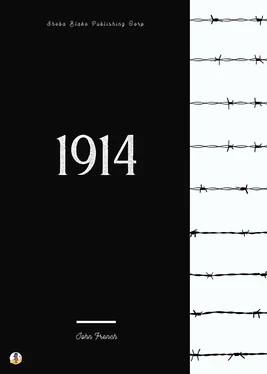I visited in particular one Artillery Brigade, some of whose guns had been saved from capture on the previous day by the cavalry. The Brigade Commander broke down with emotion as he recounted to me the glorious bravery displayed by Francis Grenfell and the 9th Lancers.
This Brigade fought magnificently for several hours next day on the Le Cateau position.
All reconnaissance and intelligence reports received up to midnight on the 25th concur in saying that Cambrai was then still in the possession of the French, and that the position there was not yet seriously threatened; further, that whilst there were clear signs of the outflanking movement in progress, no considerable bodies of the enemy had yet crossed the line Valenciennes—Douai, and that, after their repulse at Solesmes by McCracken and Allenby, the enemy was not in strength south of the line Valenciennes—Maubeuge.
This estimate of the situation was confirmed by a German wireless message, intercepted towards the evening of the 26th, which stated that the outflanking German Corps was only at that time “moving towards” Cambrai, and that the remaining Corps, which were engaged in the frontal attack, were only then “moving on” towards Cattenières, Walincourt and Le Cateau respectively.
The 1st Corps had, as we know, experienced a much harder day’s march on the 25th, and was attacked at Landrecies and its neighbourhood before it could get any rest at all. Sir Douglas correctly appreciated the strength of the enemy on his immediate front and gauged the situation, namely, the German design to impose on us the idea that he was in great strength, and to pin our troops to the ground whilst his flanking movement became effective.
For this purpose the enemy had hurried forward a large force of Artillery, composed of guns and howitzers of all calibres, escorted and protected by four Cavalry Divisions and a limited number of jäger battalions.
These troops were pushed forward against the 2nd Corps at Le Cateau as they had been against the 1st Corps at Landrecies, and with a precisely similar purpose.
The superb gallantry of the troops, and the skilful leading by Divisional and Brigade and Battalion Commanders, helped very materially by the support given by Allenby and, as I afterwards learned, by Sordet and d’Amade, saved the 2nd Corps, which otherwise would assuredly have been pinned to their ground and then surrounded. The cavalry might have made good their retreat, but three out of five Divisions of the British Army with the 7th Brigade must have been lost.
The enemy, flushed by this primary victory, would have pressed in on the flanks of the 1st Corps, cut off their retreat, and, continuing his combined front and flank attack, would have almost certainly pushed the whole Allied Army off their line of retreat, and a stupendous repetition of Sedan might well have resulted.
The magnificent fight put up by these glorious troops saved disaster; but the actual result was a total loss of at least 14,000 officers and men, about 80 guns, numbers of machine guns, as well as quantities of ammunition, war material and baggage, whilst the enemy gained time to close up his infantry columns marching down from the north-east, at the cost of losses not greater than, if as great, as our own, but which were, in view of the immense superiority he possessed in numbers and fighting power, infinitely less important to him.
The effect upon the British Army was to render the subsequent conduct of the retreat more difficult and arduous.
The hope of making a stand behind the Somme or the Oise, or any other favourable position north of the Marne, had now to be abandoned owing to the shattered condition of the Army, and the far-reaching effect of our losses at the Battle of Le Cateau was felt seriously even throughout the subsequent Battle of the Marne and during the early operations on the Aisne. It was not possible to replace our lost guns and machine guns until nearly the end of September.
In my dispatch, written in September, 1914, I refer eulogistically to the Battle of Le Cateau. I had been, together with my staff, directing the movements of the British Army day and night up to the time of the Battle of the Marne—in the course of which battle I received an urgent demand from the Government that a dispatch should be forwarded.
It was completed, of necessity, very hurriedly, and before there had been time or opportunity to give thorough study to the reports immediately preceding and covering the period of that battle, by which alone the full details could be disclosed.
It was, indeed, impossible, until much later on, to appreciate in all its details the actual situation on the morning of August 26th.
At the time the dispatch was written, indeed, I was entirely ignorant of the material support which was rendered throughout the day by Generals Sordet and d’Amade, and I accepted without question the estimate made by the commander of the 2nd Corps as to the nature of the threat against him and the position of the German forces opposed to him.
It is very difficult for the uninitiated to realise the concentration which the direction of an Army carrying out a vigorous offensive like that of the Marne, demands from the brain of the Commander-in-Chief, if he is to make the best use of the forces under his command.
In the surroundings and under the conditions of a great battle, the preparation of material for and the compilation of any dispatch is a matter of great difficulty. It is very easy to say: “Why not employ others?” I have always held that it is only the General who conducts an operation of any magnitude who can, or should, sum up and describe it. No one else can know what was passing in his mind, or how his judgment was directed and formed by the swiftly moving procession of events.
Nor can exact information become available for weeks or months, sometimes, indeed, even for years, after the conclusion of a particular series of operations.
In more than one of the accounts of the retreat from Mons, it is alleged that some tacit consent at least was given at Headquarters at St. Quentin to the decision arrived at by the commander of the 2nd Corps. I owe it to the able and devoted officers of my Staff to say that there is not a semblance of truth in this statement.
Конец ознакомительного фрагмента.
Текст предоставлен ООО «ЛитРес».
Прочитайте эту книгу целиком, купив полную легальную версию на ЛитРес.
Безопасно оплатить книгу можно банковской картой Visa, MasterCard, Maestro, со счета мобильного телефона, с платежного терминала, в салоне МТС или Связной, через PayPal, WebMoney, Яндекс.Деньги, QIWI Кошелек, бонусными картами или другим удобным Вам способом.












